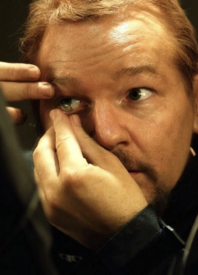
Julian Assange was once a free man, and it’s strange to see him like this in Laura Poitras’ Risk. Through this documentary, she follows the Wikileaks for six years, beginning in 2010 as his leaks cause major political upheaval. She documents him as he makes public appearances, a thing he eventually stops doing as the Swedish government issues an arrest warrant for him. He avoids the accusations by hiding within the Ecuadorian embassy, and as strange as this is to write, credit is due that the documentary comes off as dynamic even if its main subject stays in the same place. Part of that credit goes to the doc’s cinematographer and producer Kirsten Johnson. Another point of interest how the doc frames the women working with Assange especially because of the allegations.
I was never a fan of Wikileaks, which may have a lot to do with my lazy character but also has a lot to do with the fact that the leaks have the occasional bombshell revelations within mostly dry documents. Poitras’ Risk may have flaws that are different from the man it’s capturing, but she at least reminds us of the interesting global landscape that was once Obama’s America. She also uses gradations with her storytelling. In doing so, she pains a succinct picture of a man who can intimidate important figures within governments. That same man, as well, is just a normal man hanging out with friends, trying to get a haircut while listening to 80s music. His one disguise also gives the doc some much needed levity.
Calling this portrait of Assange a prequel to Poitras’ previous Academy Award Winning documentary Citizenfour feels reductive. Risk is more of an expansion, and in choosing to stick with a complex figure like Assange, there’s a danger of coming out with an unwieldy product. That may the problem here, since a lot of the connective tissue here feels missing. Why is this portrait jumping from Assange to the Arab Spring, or who are his defenders from both mainstream genders? A lot of the key players on screen feel like figures within an esoteric community which feels unfortunate. This is especially true because of a third act reveal about a man who was Assange and Poitras’ close associate, Jacob Appelbaum.
Regardless of Risk‘s flaws, it still comes off as an audacious work in both definitions of that work. There’s an understandable reluctance from Poitras’ part to make herself a supporting character here. However, she does so when it matters. Through narration, she recollects moments from when she knows the FBI was spying on her. She also adds audio clips of agents talking about targeting her. In working with Assange, she gains the same enemies as his. But she doesn’t forget the flaws of the man and the community to which he belongs. She narrates about wanting a different ending for the documentary. And she ends up by showing the complex legacy of a man who changed the world, maybe for the worst.
Risk, originally a Showtime documentary, is now available on MUBI.
- Genre: Documentary
- Directed by: Laura Poitras
- Produced by: Kirsten Johnson, Laura Poitras
- Studio: Field of Vision, Praxis Films

